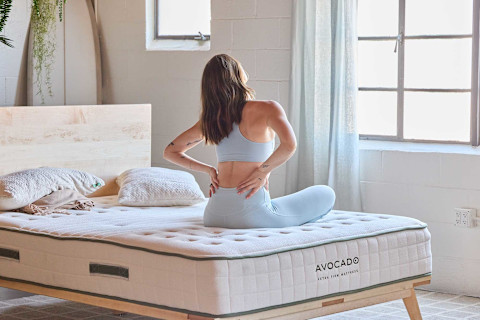Are You Optimizing Recovery? Without This, Maybe Not

From red light panels and infrared saunas to personal cold plunge pods and handheld massage therapy devices—there’s no doubt about it, recovery is a hot topic in the fitness and wellness space.
While these tools are certainly worth looking into, they may not make a meaningful impact if you’re overlooking recovery’s most important habit: sleep. The science is clear that sleep is what actually transitions the body into repair mode1, encourages muscle growth, replenishes energy, and even encourages mental and cognitive recovery.
And to optimize your time in bed, make sure you have a mattress that supports your body’s unique needs. It’s (quite literally) the foundation for a deep, restorative night’s rest.
Getting back to basics: The science of sleep & recovery
When you sleep, your body is actually hard at work—both repairing damage from the day before and getting you ready for what's to come when you wake up.
For those who are active, this time becomes even more precious as the key timing for optimizing physical and mental performance.
- Deep NREM sleep (Stage 3) is where true physical recovery happens. With the brain less active during this time, blood flow surges to muscles and tissues, delivering the oxygen and nutrients needed to rebuild and restore.
- In these deeper stages of sleep, human growth hormone (HGH) is released2, which aids in repairing tissues, strengthening bones, converting fat to fuel, and creating collagen (found in joints, tendons, and skin).
- Nighttime spikes in HGH also drive muscle protein synthesis,3 the process of turning amino acids into lean muscle. This is one reason why quality sleep is just as essential for gains as your workouts are.
- Glycogen is a primary source of energy stored in our muscles, which we tap into during physical activity. Sleep is a core part of maintaining optimal glycogen stores, as it’s a time the body can reduce energy expenditure and instead focus on replenishment.
- And it’s not just physical: Mental recovery is equally important for optimal performance, be that at the gym, home, or office. During sleep, the brain performs vital restorative functions. In addition, it is essential for memory consolidation4, learning, and decision-making.
The effects of losing out on this restorative time are staggering: Even one night of sleep deprivation5 can decrease muscular endurance and strength, and plenty of research has shown other negative impacts on athletic performance, from increased perceived effort to reduced speed and accuracy.
No matter if you’re an athlete, an everyday athlete, or just someone looking to become more active, you can’t outperform poor sleep—rest is non-negotiable fuel for both body and mind.
The sleep foundation an active body needs: A quality mattress
That deep, restful sleep is always the goal—but not always easy to get. Mass surveys show that 1 in 3 adults in the U.S. say they don’t get enough sleep on a regular basis. Interestingly, research shows that athletes struggle with sleep more than the general population.
To improve your sleep quality, start by creating a healthy environment. This may include small tweaks like limiting screen time an hour before rest, eliminating all artificial light exposure when it’s time for shut-eye, and setting the thermostat to the ideal sleep temperature of around 68°F.
But even then, many people still struggle to fall asleep, stay asleep, and wake up rested. That may be a sign your body is craving a different mattress.
A mattress is the single most important investment you can make for sleep. Finding the right mattress for your body type, sleep position, and comfort needs will help support proper alignment, reduce pressure points, and improve overall sleep quality.
And for certain individuals—big and tall sleepers, those who prefer stomach and back positions, athletes and other highly active individuals—that will mean finding an extra firm mattress.
An extra firm mattress for maximum support
Designed from the inside out, the Avocado Extra Firm Mattress sets the standard for firm sleep.
It features up to an impressive 2,112 individually wrapped coils (30% more than standard designs) to improve responsiveness and pressure distribution. These double-tempered recycled steel coils are 25% stronger than the industry standard, providing a firm, responsive sleep surface. Combine that with high-density natural materials, and this mattress provides a solid, stable sleep surface that resists sagging, ensures pressure relief, and delivers ergonomic alignment.
It also has a natural ability to keep you cool at night, not with heat-trapping memory foams or questionable cooling chemicals. Instead, it relies on breathable organic Dunlop latex (D65), ventilation from hundreds of small airflow channels, firm coconut husk pads infused with natural latex and organic wool to wick away moisture.
Because mattress quality isn’t just about how it feels—it’s about what it’s made of. You spend a third of your life in bed, and Avocado makes sure that time supports your long-term well-being.
The Avocado Extra Firm Mattress is the only extra firm mattress that’s certified organic. It’s crafted with GOLS-certified organic Dunlop latex, and GOTS-certified organic wool and cotton. In addition, Avocado is the only OEKO-TEX STANDARD 100 innerspring mattress currently available, ensuring the highest standards for health and safety. The brand also uses no flame retardants and tests for unsafe levels of PFAS. Because you deserve peace of mind as you drift asleep.
The takeaway
No matter how advanced your recovery toolkit gets, it all starts with sleep—and sleep starts with the right mattress. For bodies that need maximum support, the Avocado Extra Firm Mattress delivers the foundation for strength, recovery, and lasting well-being.
5 Sources
- https://www.ncbi.nlm.nih.gov/books/NBK482512/
- https://www.frontiersin.org/journals/endocrinology/articles/10.3389/fendo.2023.1332114/full
- https://www.ncbi.nlm.nih.gov/pmc/articles/PMC10488332/#:~:text=Growth%20hormone%20(GH)%20is%20produced,during%20deep%20sleep%20%5B3%5D.
- https://www.nature.com/articles/s41593-019-0467-3
- https://pubmed.ncbi.nlm.nih.gov/19543909/




